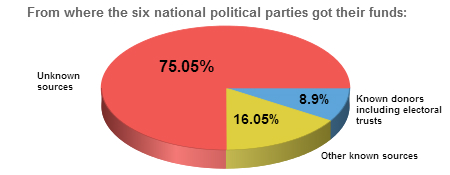A large chunk of the funds raised by the six national political parties
between 2004-05 and 2011-12 came from sources that have been described
as 'unknown', reveals a recent analysis made by Association for
Democratic Reforms (ADR) and National Election Watch.
The bulk of the funds national political parties in India garner are
from sources that they are not obliged to reveal because the donation
falls in the below Rs 20,000 range, said an analysis made by the two
organisations. The parties included in the analysis were Congress (I),
BJP, BSP, NCP, CPI and CPI (M) and the data relating to known donors was
sourced from contribution statements submitted by them to the Election
Commission of India between 2004-2005 and 2011-12. The 'unknown' source
income figures were derived from the IT returns filed by the parties.
Of these parties, the CPI was the only one whose income from unknown
sources - Rs 1.47 crores, was less that the funds garnered from known
sources - Rs 8.54 crores.
The analysis reveals that known donors including electoral trusts
accounted for only a fraction of the total income of these parties
totalling Rs 4,895.96 crores during this period. After taking into
account income from other known sources such as sale of assets,
membership fees, bank interest, sale of publications, party levy, sale
of coupons etc, about three-quarters of their income fell into the
'unknown' category.

"Since a very large percent of the income of political parties cannot be
traced to the original donor, full details of all donors should be made
available for public scrutiny under the RTI. Some countries where this
is done include Bhutan, Nepal, Germany, France, Italy, Brazil, Bulgaria,
the US and Japan. In none of these countries is it possible for 75 per
cent of the source of funds to be unknown, but at present it is so in
India," said an ADR statement.
The Stockholm‐based International Institute of Democracy and Electoral
Assistance (IDEA) had stated, "India is … among a mere 10 per cent of
countries in the world to allow either political parties or candidates
to receive anonymous donations’.
Six electoral trusts had made contributions totalling Rs 105.86 crores -
mostly to the Congress (I) and BJP - during this period: General
Electoral Trust of the Aditya Birla Group, Electoral Trust of Tata Sons,
Bharti Electoral Trust of Bharti Enterprises, Satya Electoral Trust,
Harmony Electoral Trust and Corporate Electoral Trust.
Details of donors who account for contributions by electoral trusts
should be available in the public domain for better transparency. The
Finance Bill introduced in 2009 has stipulated that 95 per cent of the
income of such trusts should be donated to political parties. Whether
this is being done has to be verified, ADR has reccommended.
Electoral trusts should also not be permitted to accept foreign funds
since foreign funding to political parties is prohibited under law.
"Subsidiaries of foreign companies, who get around the law by
registering in India, but receive their funding from overseas, should
also not be allowed to fund political parties."
"The National and other political parties must therefore continue to
provide all information under the Right to Information Act. This will
only strengthen political parties, elections and democracy," ADR said.

No comments:
Post a Comment